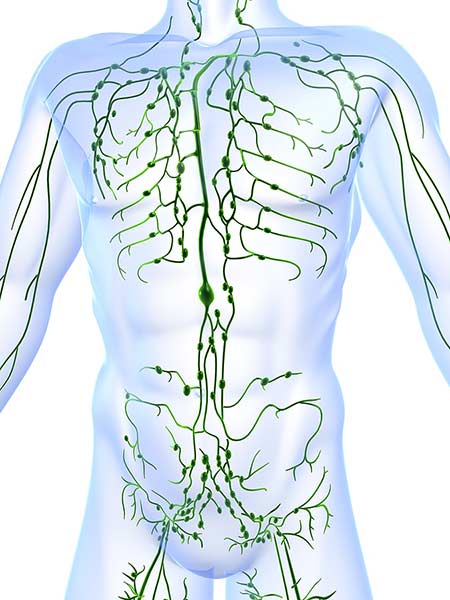The Lymphatic System and Why It Matters
May 25th, 2018
The Lymphatic System is a Waste Management System
Bodies are a lot like cities. A central core, a network of connecting pathways that get smaller as they move outward, even a governing body that watches over the system and ensures that everything functions properly. The metaphor works surprisingly well, even down to the parts of bodies and cities that we forget—or simply never knew existed.
The average person does not know much about what happens to the garbage and recycling left out on the curb, or the water that runs through their pipes and into the sewers. When pressed, many of us could scramble together some details about landfills, recycling plants, and water processing facilities, but the reality is that most of us get foggy about the specifics of one of the most important functions of the cities we live in.

The same thing is true about our bodies. Where do used up proteins go when cells are finished with them? Where are body fluids sifted through to make sure there aren’t any dangerous invaders like bacteria and viruses? How do bruises and swelling get reabsorbed?
When asked to answer these questions most people will think of the blood in the circulatory system. The truth is that the circulatory system only does half the job. Thanks to the heart, blood is pumped through the arteries and veins, bringing with it important hormones, nutrients, and fluid needed to keep tissues healthy. The nearby tissues then make use of these newly arrived substances, and, just like we do with our black bags and blue bins every week, these tissues throw out what they can’t use. The circulatory system is not equipped to reabsorb the vast majority of these waste products, so the body needs a separate system to meet that need: the lymphatic system.
Essentially, the lymphatic system functions as a drainage and filtration system for fluid and waste products. The lymphatic vessels, much like veins, shuttle the lymph (made up of fluid, waste products, fats, and immune cells) along through a series of lymph nodes, which filter the lymph and monitor it for any parasites and foreign substances. In this way, the lymphatic system is important for fluid balance, waste removal, and immune function.
Ever seen what happens when waste management workers go on strike? With that image in mind, you can get a pretty good idea of what can happen when the lymphatic system is not functioning optimally. Furthermore, build-up of waste products can develop even in a healthy lymphatic system that’s being challenged by, for example, a sprained ankle or a particularly nasty bruise.
Luckily, fluid movement through the lymphatic system can be sped up on your own using deep breathing techniques, and with the help of a therapist trained in Manual Lymphatic Drainage (MLD). An MLD session involves gentle, repetitive movements across the skin in specific patterns designed for maximum efficiency. This technique helps to move fluid from the interstitium into the lymphatic vessels, and to increase the force and rate of vessel contraction. While MLD is most well known for its treatment of primary and secondary lymphedema, the ubiquity and importance of the lymphatic system makes this technique useful for a wide variety of issues. It is particularly helpful in cases of acute non-infectious inflammation (like that sprained ankle I mentioned earlier), chronic congestion and digestive issues, and skin conditions including acne, scars, and burns. Generally, giving the lymphatic system an extra boost also helps to improve sleep, decrease anxiety, speed up healing, and promote relaxation.
Not bad for a system that many people haven’t heard of, eh?
Di Belzil, RMT Synergystix Partners in Health
Posted in Health

